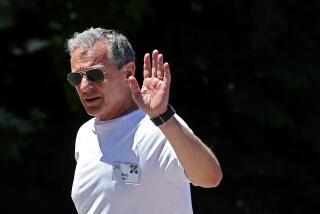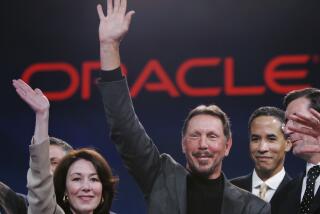2nd Disney Director Resigns as Feud With Eisner Widens
Walt Disney Co. Chairman Michael Eisner’s feud with dissident directors widened Monday as Stanley P. Gold joined his boss, investor Roy E. Disney, in quitting the board while vowing to press for the ouster of their handpicked chief executive, a man they say has dragged down the company.
In an hourlong interview in their Burbank offices, Gold and Disney stopped short of saying they would call for a shareholder vote to remove Eisner. Instead, the departing directors said they would “educate the owners of the company” about its deteriorating performance under Eisner and the directors who have acted as his “puppeteers.”
The two men said they already had begun to make their case with large institutional investors, although they acknowledged that they expected strong resistance from the company.
“Hopefully,” Gold said, “we can bring some pressure from the outside on this board because we were unable to do that from the inside.”
Eisner, who enjoys the board’s support, appears in no imminent danger of losing his job. The company’s financial picture, in fact, has improved during the last year, largely because of a string of successful movies.
Nonetheless, the breach represents one of the nastiest battles in Eisner’s 19 years at the helm of the Burbank entertainment giant and an extraordinary public airing of a behind-the-scenes feud that has been simmering for nearly two years.
Eisner, in New York for a board meeting today, was unavailable for comment. But a statement released by the company’s independent directors said they “categorically reject Mr. Gold’s untrue and unwarranted allegations about the Company and the Board. As he has done repeatedly in the past, Mr. Gold in his letter persists in characterizing the Board’s failure to agree with him as failure to consider the issues he has raised.”
The statement accused Gold and Roy Disney of doing “a disservice to shareholders” when the company’s “performance is improving as a result of growth plans and initiatives being implemented by management with Board approval.”
The directors said the board had extensively discussed Gold and Disney’s continuing concerns, but refused to accept “their principal recommendation to replace management.” They called Gold and Disney’s moves a “destructive course of action.”
Support also emerged from one of Eisner’s peers in the media world. Viacom Chairman Sumner Redstone said in an interview with CBS MarketWatch that the Disney executive was a “great leader” and his company was becoming “greater every day.”
Still, throughout the Disney empire, employees were stunned by the furor that has suddenly shaken their company. Some mourned the loss of the last remaining link on the board of directors to the founding family of the entertainment giant. Still others drew consolation from the hope that Roy Disney’s departure would be cathartic for a company that has been through much upheaval in recent years.
In his interview with The Times on Monday, Roy Disney said the decision to leave the company that just awarded him a 50-year service pin was “massively emotional.”
As he arrived at the Burbank lot Monday morning to pack up his belongings, he was greeted by well-wishers. “I quite literally spent my whole life there,” said the son of Roy O. Disney, who founded the company with his more famous brother, Walt.
Some of the most pointed comments in the interview came when Roy Disney and Gold accused Eisner of petty, retaliatory actions against them.
Disney said that in recent weeks Eisner tried to ban him from screenings of upcoming works from the animation department, of which Disney was chairman. He said he learned of the screenings by accident and attended them anyway. He said Eisner, when confronted, said he did not want to subject the 73-year-old nephew of Walt Disney to potential embarrassment if the films were scrapped.
“He was turning himself into a pretzel to explain why he didn’t want me to go to a screening involving a department of which I’m chairman,” Disney said.
Disney said he was forced to have clandestine lunches with employees at the Lakeside Country Club in Toluca Lake instead of at the Burbank studio lot because Eisner was keeping tabs on his activities and conversations with associates.
Eisner also quashed a trip Disney said he planned to take to Pixar Animation Studios in Emeryville, Calif., to show scenes from an upcoming short animation feature to his longtime friend and former Disney colleague, director John Lasseter.
Despite the push by Disney and Gold for a shareholder uprising, media analyst Anthony Valencia of TCW Group Inc. said he did not anticipate one anytime soon.
“Investors, like a lot of people, are a what-have-you-done-for-me-lately crowd,” he said. “And lately, the stock has done well.”
Valencia speculated that the reason Disney wrote his resignation letter was to make the company more accountable and more careful to avoid missteps.
“He is setting them up, potentially, for the big ‘I told you so,’ ” Valencia said.
Disney’s letter came after he learned that members of the board’s nominating committee were going to leave him off the slate of directors to be reelected this coming year, citing a retirement age limit of 72 adopted as part of the company’s new corporate governance rules.
Gold, in his letter, also cited a number of alleged failings by Eisner and the board, including a lack of leadership and oversight.
Despite a hot run by the company’s movie studio, Gold and Roy Disney said Eisner had failed to resuscitate the ABC television network, botched the acquisition of the ABC Family cable channel and let relations deteriorate at Disney’s Miramax Films unit as well as with Pixar Animation Studios.
Gold, 61, said he and Disney objected to the board’s decision last year to grant a $5-million bonus to Eisner, saying the company’s financial performance didn’t merit it. For the same reason, Gold said, he recently wrote to the board’s compensation and governance committee to oppose a proposed increase in fees to directors.
Disney and Gold plan to argue to investors that the company’s stock has been effectively flat for seven years and has failed to match the performance of competitors and that return on equity has fallen from 18.5% in 1995 to 5% now.
The reaction on Wall Street to the board uproar was muted Monday. Disney shares gained 8 cents to close at $23.17 in New York Stock Exchange trading.
Disney and Gold called the company’s newly enacted governance rules a sham aimed at further entrenching Eisner. Gold said the age limit of 72 that would force Roy Disney’s retirement was not designed for management employees, of which Disney was one, and that directors have been flexible in enforcing the rules. For example, they said, the board has not aggressively enforced another requirement that directors own shares worth at least $100,000.
Gold said Disney, who wanted to remain on the board, was being exiled because of his criticism of Eisner, the same fate that he said befell another dissident director, Andrea Van de Kamp, earlier this year.
“They’re happy to have us gone. They’ve been pushing us out.... They push anybody with dissent out,” Gold said.
Disney and Gold formerly were among Eisner’s strongest allies, responsible for his hiring when they spearheaded a 1984 coup at the company.
Gold was so happy with the hiring in tandem of Eisner and the late Disney President Frank Wells that he bought a vanity license plate for his Mercedes-Benz convertible. It said “10-3,” referring to a bad prediction by a Disney board member that Eisner and Wells would be spurned by that margin in favor of former 20th Century Fox Chairman Dennis Stanfill.
Gold oversees the investments of the Roy E. Disney family through Burbank-based Shamrock Holdings and has been the director most at odds with Eisner over the last three years, frequently circulating scathing reports critiquing the company. On Monday, he urged the firm to release his reports.
In the interview at Roy Disney’s Shamrock headquarters, named for one of his racing sloops, he and Gold said they decided last week to act jointly, much as they have done since their first meeting in the late 1970s when Gold’s former law firm assigned him to work with Disney. Gold later helped cut Disney’s umbilical cord to the company, where most of his wealth was tied up, and turned Shamrock Holdings into one of the most active of the corporate raiders of the 1980s.
Gold said he and Disney wouldn’t give up.
“For two years, we’ve been working inside the company trying to make changes,” he said. “We’re not going to go away.”
*
Times staff writer Kathy M. Kristof contributed to this report.
*
(Begin Text of Infobox)
Stanley P. Gold
Born: Sept. 10, 1942
Education: Bachelor’s degree in political science from UCLA; law degree from USC
Career highlights: In 1985, he joined Roy E. Disney at Shamrock Holdings, the Burbank investment firm owned by the Roy Disney family. Gold was a managing partner in Los Angeles law firm Gang, Tyre, Ramer & Brown Inc. He was elected to the Walt Disney Co. board of directors in 1987.
Sources: Times stories, Martindale-Hubbell, Shamrock Holdings;
Compiled by Times librarian Joan Wolff
Los Angeles Times
More to Read
The biggest entertainment stories
Get our big stories about Hollywood, film, television, music, arts, culture and more right in your inbox as soon as they publish.
You may occasionally receive promotional content from the Los Angeles Times.











